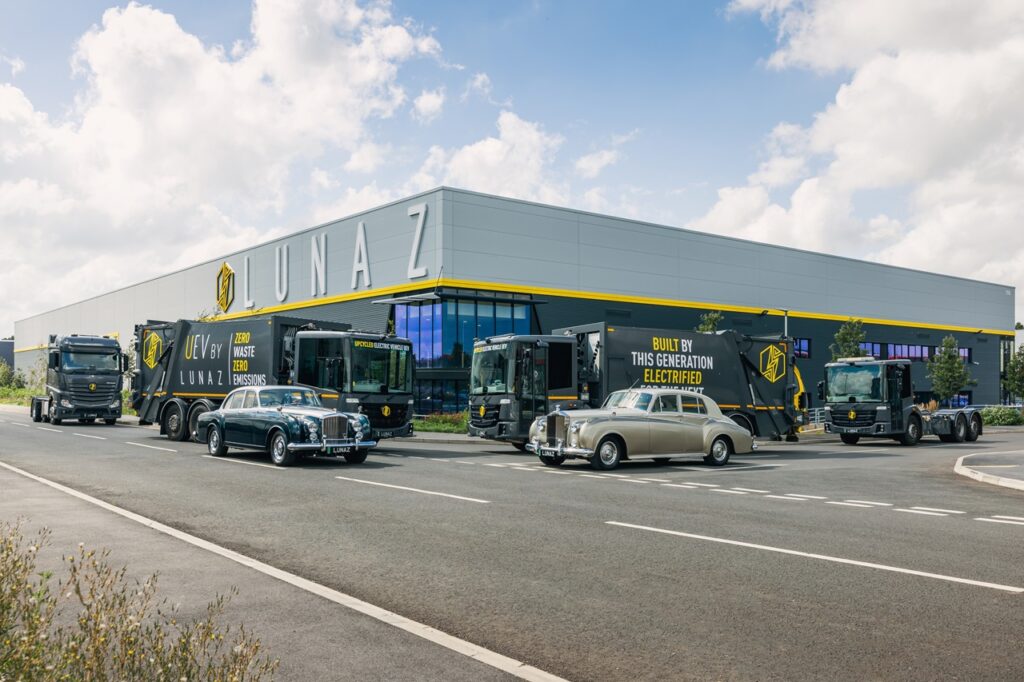Altilium, a UK-based clean technology group focused on supporting the transition to net zero, has today announced a partnership with Lunaz, Europe’s largest upcycling and vehicle electrification business, to develop an innovative and low carbon logistical solution for the safe transportation and discharging of end-of-life EV batteries.
The pioneering project, which has received funding from the Automotive Transformation Fund (ATF), is the latest addition to Altilium’s comprehensive ecosystem of technological solutions, developed to ensure the responsible management of EV batteries, from end-of-life collection to direct re-use of recovered materials in the production of new batteries.
Through this collaboration, Lunaz’ team of engineers will utilise its electrification expertise and proprietary technology to develop a prototype upcycled electric Heavy Goods Vehicle (HGV), specifically designed to transport end-of-life EV batteries, and capable of harvesting and running on electrical energy remaining in the batteries. This will enable their efficient, sustainable transport to Altilium’s planned recycling facilities, with the lowest environmental impact, while also discharging them prior to recycling.
Kamran Mahdavi, CEO of Altilium, commented: “We’re excited to be driving innovation and shaping the future of sustainable, low carbon battery raw materials with our partners at Lunaz, who are at the cutting edge of upcycling ICE vehicles into EVs. Millions of EV batteries will need to be transported by the next decade for recycling or a second life. We are committed to developing low carbon logistical solutions that can cope with these high volumes of waste and support the development of a domestic circular economy for battery metals.”
Altilium plans to open the UK’s largest EV battery recycling plant in Teesside in 2026. The facility will have the capacity to recycle batteries from 150,000 EVs a year, producing 30,000 MT of Cathode Active Materials (CAM) for return and reuse in the EV battery supply chain. By expanding its activities into spent battery collection and management, Altilium will be uniquely positioned to tackle the high levels of end-of-life battery waste expected in the UK (around 1.4 million batteries per year by 2040), as part of its full battery circularity customer offering.
David Lorenz, founder and CEO of Lunaz, added: “Lunaz is proud to have closed the circularity loop with this partnership, further strengthening the company’s position as a fully integrated clean-tech leader. By unlocking the power of upcycling, something we are now able to at every stage of our unique process, we can provide even greater value and an ever-lessening carbon footprint.”
By upcycling existing vehicles, Lunaz allows fleet operators and governments to transition their industrial vehicle fleets to clean-air powertrains while reversing the ecologically damaging cycle of replacing-with-new. Every upcycled electric vehicle (UEV) produced by Lunaz saves up to 82% of the embedded carbon within that vehicle. Lunaz’ technology has already been proven in prototype vehicles, with the first upcycled fleet of vehicles set to roll out later this year, through a partnership with waste management company Biffa.
Work will be performed at Lunaz’ upcycling campus in Silverstone, which has capacity to upcycle more than 1,110 industrial vehicles to zero emissions powertrains every year.

Transporting old EV batteries is challenging and expensive, given their weight and health and safety risks. On average, transportation represents 41% of the total cost of recycling and contributes 3.5% of life cycle GHG emissions for a recycled battery. Through this project, Altilium hopes to reduce the carbon footprint of battery recycling by up to 5%.
About Altilium
Altilium is a UK-based clean tech group that will reshape the UK and European automotive supply chain by offering high volume, low carbon domestic sources of cathode and anode materials from recycling waste streams already in circulation, such as lithium scrap.
In 2022, the company opened its Battery Recycling Technology Centre in Devon, to deepen and strengthen its competitive edge in the recycling of lithium-ion batteries. The scale-up processing line will provide the company with data to make informed decisions on materials handling, scalability, and product quality at the UK’s largest planned EV battery recycling facility, to be located in Teesside. The plant will have the capacity to process scrap from over 150,000 EVs per year, producing 30,000 MT of CAM, 20% of the expected demand in the UK and one of the largest projects in the UK and Europe.
To date, Altilium has secured over £6M in backing from UK government innovation awards, including grants from the Faraday Institutions Battery Challenge and the Automotive Transformation Fund. The company recently completed its Series A funding round with a multi-million pound investment from SQM Lithium Ventures, the corporate venture arm of the lithium business of Sociedad Quimica y Minera de Chile (SQM), one of the world’s leading producers of battery-grade lithium.
For more information go to www.altilium.tech